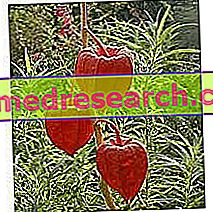
Scientific name
Physalis alkekengi L.
Family
SolanaceaeOrigin
Alkekengi is a characteristic oriental plant.
Synonyms
Winter Cherry.
Used Parts
In herbal medicine the drug consisting of the berries is used, enclosed in an orange-red colored casing; leaves and stems are also often used, although they are richer in alkaloids.
Physiological constituents
- alkaloids;
- mucilage;
- Bitter principles;
- Tannins;
- Carotenoids;
- Flavonoids;
- Ascorbic acid.
Alkekengi in Herbalist: Property of the Alkekengi
Physical properties include diuretic, purifying and laxative properties, but they are also attributed antiuric, antirheumatic and refreshing activities.
Biological activity
As mentioned, alkekengi are mainly ascribed diuretic, depurative and laxative properties. For this reason, in phytotherapy the alkekengi is mainly used against urinary retention in the case of nephritis, gout and calculi of uric acid.
However, the use of alkekengi has not obtained official approval for any kind of therapeutic indication.
However, a recent study (2016) conducted both in vitro and in vivo has shown that alkekengi ethanol extracts have interesting anti-inflammatory and antibacterial activities.
The anti-inflammatory activity seems to be carried out mostly by the flavones contained in the plant through a mechanism of action that involves the decrease of the levels of TNF-α (tumor necrosis factor alpha), prostaglandins E2, nitric oxide (NO) and interleukins 1 and 6.
However, despite the encouraging results obtained from this research, before being able to approve similar applications of alkekengi in the medical field, in-depth clinical studies are needed, so as to determine the real efficacy and safety of use even on humans.
Alkekengi in folk medicine and in homeopathy
In folk medicine, alkekengi - in addition to being used for the treatment of gout and rheumatism - is used as a diuretic remedy to be used in case of kidney stones.
Alkekengi is also used in homeopathic settings, where it can be found in the form of granules, mother tinctures and oral drops.
Homeopathic medicine uses this plant in case of kidney stones, chronic inflammation of the urinary tract, gallstones, digestive problems and flatulence.
The amount of homeopathic remedy to be taken can vary greatly from one patient to another, also depending on the type of disorder that needs to be treated and depending on the type of homeopathic preparation and dilution that is intended to be used.
Warnings
Physalis should be used with caution and in short cycles to avoid the potential toxicity of the alkaloids contained in the fruit.
Contraindications
Ascertained hypersensitivity to one or more components.
Pharmacological Interactions
Attention to the concomitant use of preparations based on alchechengi and diuretic drugs, for a possible sum of effects, with consequent hydro-electrolytic alterations.



